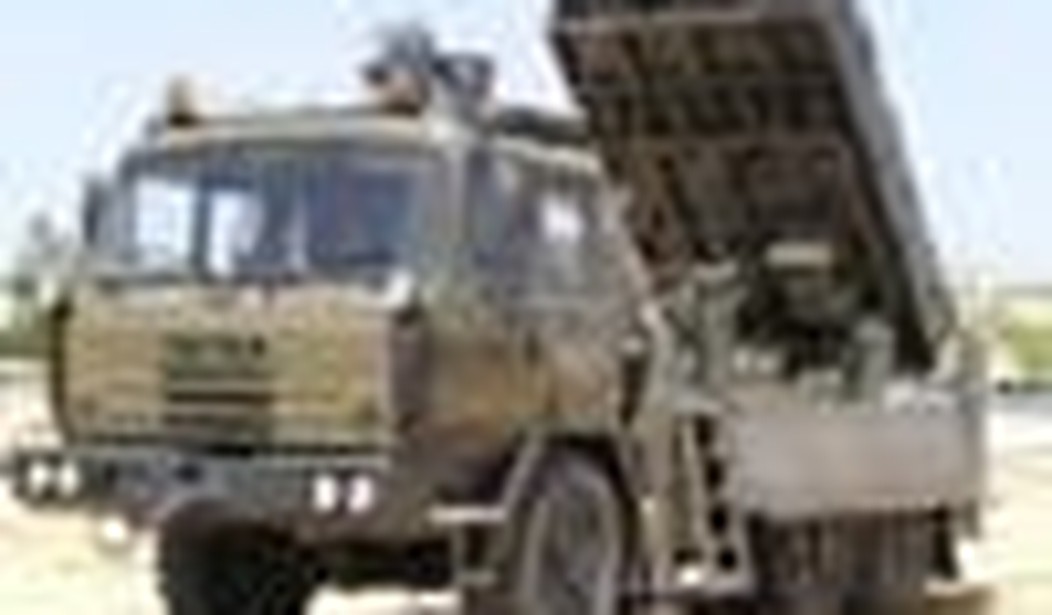For many weeks, it seemed as if Israel was successful at staying out of the turmoil rocking the Middle East. First Tunisia, then Egypt, Bahrain, Libya, Syria, and Jordan: as anti-regime demonstrations caught fire across the Middle East, Israel’s supporters were able to argue convincingly for the first time in decades that the presence of the Jewish state is not necessarily the source of all instability in the region.
But suddenly, it seemed as if Hamas leaders in Gaza, like angry toddlers realizing they weren’t getting enough attention, decided they needed to make some noise and grab some headlines. Perhaps they were worried that there was too much bashing of Arab dictators going on — and not enough bashing of Israel.
Whatever the reason, they began to attempt to provoke Israel into action. After months of disturbing but essentially harmless launches, the rocket attacks escalated dramatically. On March 19, without warning, 50 rockets fell in one day in the area surrounding Sderot.
The attack was the biggest barrage of rockets fired in the two years following Operation Cast Lead, and it was only the beginning. In an act of deliberate provocation, not only did the number of rockets missiles fired at Israel increase, they began to be aimed clearly at the most populated areas in the south. On March 23, Grad rockets landed square in the middle of Beersheva, Israel’s fourth-largest city, which was also a target two years ago during Operation Cast Lead.
In what was unlikely to have been a coincidence, on the same day, a bomb exploded at the central Jerusalem bus station, killing one woman and wounding tens.
And as the week wore on, rockets hit the city of Ashdod. Schools across the south were canceled, daily life in the south of the country was utterly disrupted, and suddenly, Libya and Japan were off of Israeli television screens as people wondered whether war in southern Israel was imminent, even as the allied bombs were dropping in Libya from NATO planes.
The Israeli Air Force was making attacks of their own — consistent, but relatively restrained — with bombing targeted at the launch sites in response to each wave of rocket fire on Israeli cities.
Under tremendous political pressure to do something more substantial, the government of Binyamin Netanyahu indicated that a real solution with an impressive name was on its way: a counter-rocket defense system called “Iron Dome.”
The Israeli Defense Forces are billing the Iron Dome system as a comprehensive solution to the threat of short-range rockets and mortar shells fired across Israel’s borders. They promise that it will be able to identify, intercept, and destroy the weapons before — not after — they land in Israel’s civilian population. It has been under development since 2007, when Hezbollah rockets threatened northern Israel. It is one part of a three-pronged defense: systems are also being developed against mid-range and long-range missiles.
The counter-rocket defense system was tested and declared ready to operate back in February, but had yet to be deployed until now. As rockets pelted Beersheva and Ashdod, the government and the military were attacked by commentators like Yossi Melman of Ha’aretz, who asked why it hadn’t yet been rolled out to protect their civilians under fire:
There can only be three explanations for this despicable conduct. One, IDF commanders and senior officials in the defense establishment — first and foremost among them Defense Minister Ehud Barak — are indifferent to the distress of the people in the south, who have suffered repeatedly from mortar and rocket attacks. Two, the IDF is afraid of a failure in intercepting a missile, which would publicly reveal the inadequacy of Iron Dome. On the back of remarkable success in testing, developers have boasted repeatedly it is the best system of its kind in the world.
The third, even more cynical, possibility is that Iron Dome has not been deployed because of the fear that it will be shown to have limited capabilities, which would not allow it to be sold abroad. According to reports in foreign publications over the past year, Israel is negotiating to sell the Iron Dome to Brazil, Singapore, and India.
The military, obviously, had its own explanations. One general questioned the wisdom of deploying the system before enough batteries are available to protect the entire southern region. The worry is that if only some cities are protected, Hamas will bear down and target other cities, causing more intensive damage. Indeed, when it was announced that the first battery would be set up next to Beersheva, residents of Ashdod and Ashkelon asked, “Why them and not us?”
With the knowledge that the system is still unproven, the government has taken care to lower expectations. As Iron Dome was finally deployed Sunday, Prime Minister Binyamin Netanyahu made an effort to lower expectations, cautioning that it “will not give a full or comprehensive solution to the missile threat.”
Even if it isn’t full or comprehensive, real evidence that the expensive system with the reassuring name represents any form of solution will offer a much-needed boost of confidence to the jittery population of southern Israel.









Join the conversation as a VIP Member